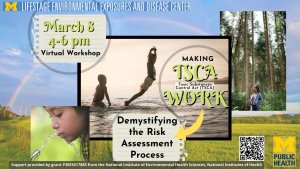Presented By: Michigan Lifestage Environmental Exposures and Disease Center
Making TSCA Work: Demystifying the Risk Assessment Process
Virtual Workshop (Toxic Substances Control Act & Lautenberg Chemical Safety for the 21st Century Act)

REGISTRATION REQUIRED
https://umich.zoom.us/webinar/register/WN_K4BCE3rXSIuGYHsJ3n5LFw
The University of Michigan M-LEEaD Center is co-sponsoring a virtual event to discuss the bipartisan legislation called the Frank R. Lautenberg Chemical Safety for the 21st Century Act. This reform law was designed to modernize the Toxic Substances Control Act (TSCA) and U.S. industrial chemical policy to promote health, but has it lived up to its promise?
Toxic chemicals can harm our health as these substances are present in everyday products (e.g., cleaning products, cookware, housing and infrastructure materials, bedding, toys). Unlike pharmaceuticals, industrial and commercial chemicals are rarely tested for safety before they reach the U.S. market. However, amended TSCA gave the U.S. Environmental Protection Agency new authorities to require manufacturers provide the data needed for risk assessments. People expect the outcomes of implementing our environmental laws to be equitable health protection for the public from environmental harms. Yet, key components of risk evaluations seem complex and thus inaccessible to the public. Our goal is to demystify the process of assessing the science to move toward evidence-based safeguards communities want for public health.
Our virtual event will examine key issues from a series of recent scientific workshops. We will present a case study of applying the principles to treating cancer and non-cancer health effects in similar manners in the risk assessment for the chemical perchloroethylene (PCE). We will explore the use of probabilistic assessments in TSCA risk evaluations. The amended TSCA gave the U.S. Environmental Protection Agency new requirements and authorities. The public health impact points to the need for the U.S. EPA to fully use its new powers to evaluate all risks from hazardous chemicals and set policies which protect health and are accountable to high-risk communities. Preventive actions are urgently needed.
Speakers and discussants include:
* Regina Strong (Office of the Environmental Justice Public Advocate for the Michigan Department of Environment, Great Lakes and Energy (EGLE));
* Wilma Subra (Technical Director, Louisiana Environmental Action Network);
* Wendy Heiger-Bernays, PhD (Clinical Professor, Department of Environmental Health, Boston University);
* Gary Ginsberg, PhD (New York Dept of Health, Center for Environmental Health (CEH));
* Chanese Forté, PhD, MPH (Assistant Research Scientist, University of California, San Francisco, Program on Reproductive Health and the Environment);
* Greylin Nielsen, MPH (Doctoral student, Department of Environmental Health, Boston University School of Public Health).
REGISTRATION REQUIRED
https://umich.zoom.us/webinar/register/WN_K4BCE3rXSIuGYHsJ3n5LFw
https://umich.zoom.us/webinar/register/WN_K4BCE3rXSIuGYHsJ3n5LFw
The University of Michigan M-LEEaD Center is co-sponsoring a virtual event to discuss the bipartisan legislation called the Frank R. Lautenberg Chemical Safety for the 21st Century Act. This reform law was designed to modernize the Toxic Substances Control Act (TSCA) and U.S. industrial chemical policy to promote health, but has it lived up to its promise?
Toxic chemicals can harm our health as these substances are present in everyday products (e.g., cleaning products, cookware, housing and infrastructure materials, bedding, toys). Unlike pharmaceuticals, industrial and commercial chemicals are rarely tested for safety before they reach the U.S. market. However, amended TSCA gave the U.S. Environmental Protection Agency new authorities to require manufacturers provide the data needed for risk assessments. People expect the outcomes of implementing our environmental laws to be equitable health protection for the public from environmental harms. Yet, key components of risk evaluations seem complex and thus inaccessible to the public. Our goal is to demystify the process of assessing the science to move toward evidence-based safeguards communities want for public health.
Our virtual event will examine key issues from a series of recent scientific workshops. We will present a case study of applying the principles to treating cancer and non-cancer health effects in similar manners in the risk assessment for the chemical perchloroethylene (PCE). We will explore the use of probabilistic assessments in TSCA risk evaluations. The amended TSCA gave the U.S. Environmental Protection Agency new requirements and authorities. The public health impact points to the need for the U.S. EPA to fully use its new powers to evaluate all risks from hazardous chemicals and set policies which protect health and are accountable to high-risk communities. Preventive actions are urgently needed.
Speakers and discussants include:
* Regina Strong (Office of the Environmental Justice Public Advocate for the Michigan Department of Environment, Great Lakes and Energy (EGLE));
* Wilma Subra (Technical Director, Louisiana Environmental Action Network);
* Wendy Heiger-Bernays, PhD (Clinical Professor, Department of Environmental Health, Boston University);
* Gary Ginsberg, PhD (New York Dept of Health, Center for Environmental Health (CEH));
* Chanese Forté, PhD, MPH (Assistant Research Scientist, University of California, San Francisco, Program on Reproductive Health and the Environment);
* Greylin Nielsen, MPH (Doctoral student, Department of Environmental Health, Boston University School of Public Health).
REGISTRATION REQUIRED
https://umich.zoom.us/webinar/register/WN_K4BCE3rXSIuGYHsJ3n5LFw
Explore Similar Events
-
Loading Similar Events...
